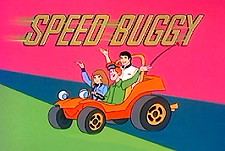
Back El superveloz Buggy Buggy Spanish Speed Buggy (série télévisée d'animation) French Speed Buggy Italian 爆走バギー大レース Japanese Szybki Buggy Polish Speed Buggy Portuguese Speed Buggy SIMPLE
| Speed Buggy | |
|---|---|
 The series' title card | |
| Created by | William Hanna Joseph Barbera |
| Directed by | Charles A. Nichols |
| Voices of | Mel Blanc Michael Bell Arlene Golonka Phil Luther Jr. |
| Theme music composer | Hoyt Curtin |
| Composer | Hoyt Curtin |
| Country of origin | United States |
| Original language | English |
| No. of seasons | 1 |
| No. of episodes | 16 |
| Production | |
| Executive producers | William Hanna Joseph Barbera |
| Producers | Iwao Takamoto Art Scott (associate) |
| Running time | 30 minutes |
| Production company | Hanna-Barbera Productions |
| Original release | |
| Network | CBS |
| Release | September 8 – December 22, 1973 |
| Infobox instructions (only shown in preview) | |
Speed Buggy is an American animated television series, produced by Hanna-Barbera, which originally aired for one season on CBS from September 8, 1973, to December 22, 1973.[1] With the voices of Mel Blanc, Michael Bell, Arlene Golonka, and Phil Luther Jr., the show follows an orange anthropomorphic dune buggy who alongside teenagers Debbie, Mark, and Tinker, solves mysteries while participating in racing competitions around the world. The series was produced by Iwao Takamoto, executive produced by William Hanna and Joseph Barbera, and directed by Charles A. Nichols.
The series was originally developed under the working titles Speed Bug and Speed Buggs before Speed Buggy was settled on. Takamoto was less involved with the series due to the trust he had in storyboard and animation artist Bob Singer. The concept for the show was inspired by the 1968 Walt Disney Pictures film The Love Bug and the Speed Racer anime franchise. Several of the storylines originated on another Hanna-Barbera series, Josie and the Pussycats.
Speed Buggy lasted for one season with a total of sixteen episodes. Despite its short run, it was broadcast on the Big Three television networks years after its original run as the channels had purchased syndication rights. It was speculated that the series acquired a fan base due to its frequent rotation on American television, often replacing quickly-cancelled new cartoons. Critical response to Speed Buggy was generally positive; some critics enjoyed its shared themes with Josie & the Pussycats and Scooby-Doo, Where Are You!, while others found it unmemorable and overly repetitive. It has since been released on DVD as part of Warner Bros.' Archive Collection on a four disc set.
- ^ Woolery, George W. (1983). Children's Television: The First Thirty-Five Years, 1946-1981, Part 1: Animated Cartoon Series. Scarecrow Press. pp. 266–267. ISBN 0-8108-1557-5. Retrieved 22 March 2020.
© MMXXIII Rich X Search. We shall prevail. All rights reserved. Rich X Search